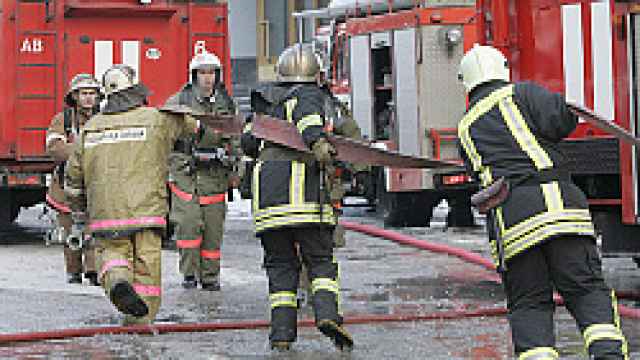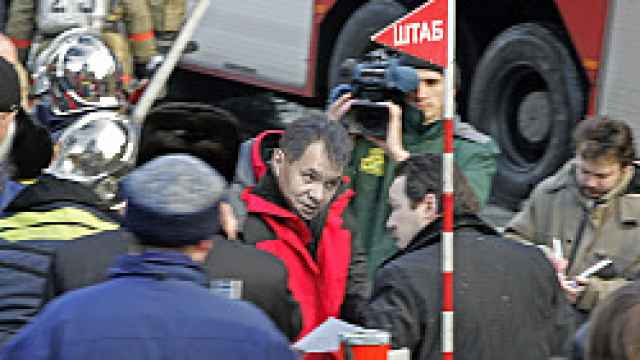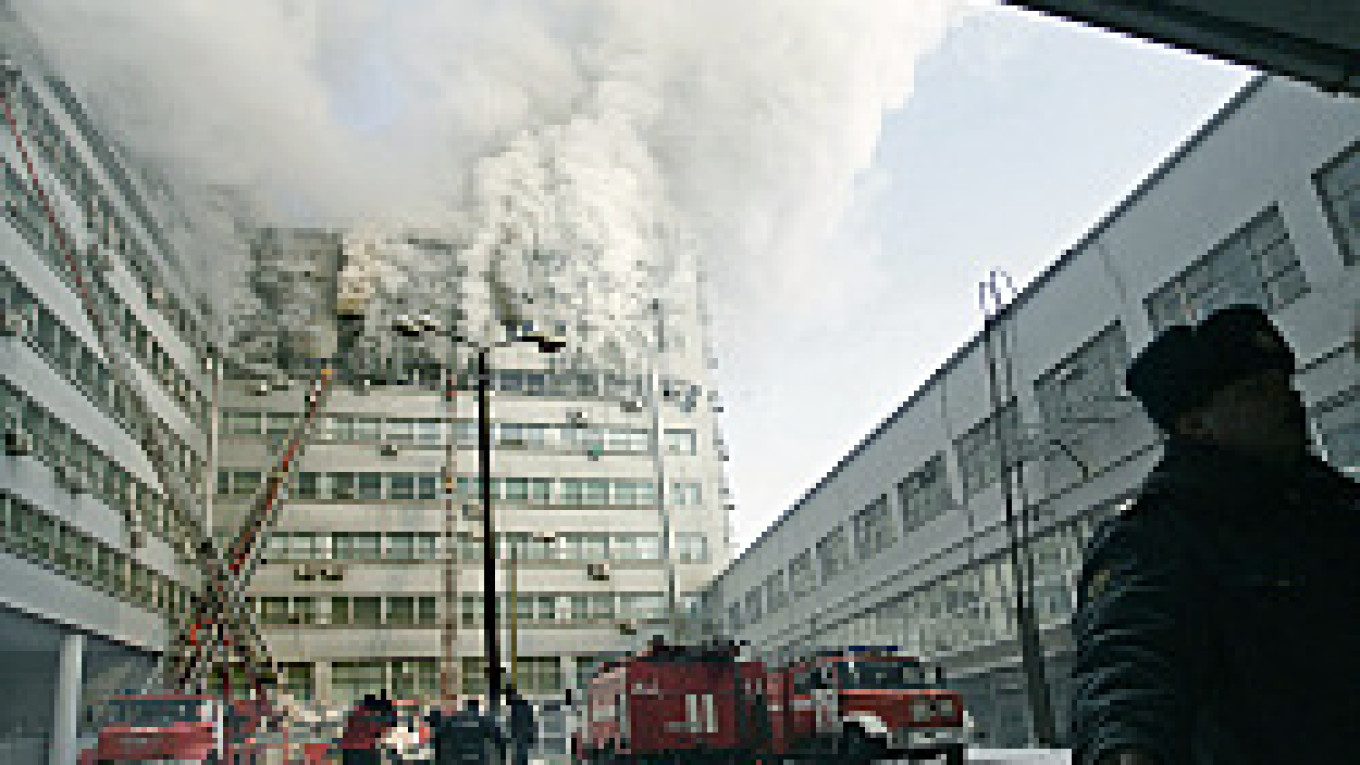The fire broke out at about 10:30 a.m. on the sixth floor of the historic Pressa printing complex at 24 Ulitsa Pravdy in central Moscow, Emergency Situations Ministry officials and witnesses said, gutting the KP office and destroying the roof of the building as it spread.
No cause for the fire has yet been determined. A KP editor said it started in the computer technicians' room.
The fire sent scores of employees at the dozens of publications operating in the complex scrambling down stairwells to escape, while a group of cafeteria workers was left stranded for an hour on a top-floor balcony before being rescued.
No one was killed in the fire, though two women who were among those rescued from the balcony were hospitalized with carbon monoxide poisoning, said a spokeswoman for the Moscow branch of the Emergency Situations Ministry, who said she could not give her name without her supervisor's permission.
Three firefighters were injured while extinguishing the blaze after they were struck by falling debris, Interfax reported. One was treated at the scene while the other two were hospitalized.
The Pressa complex is best known as the Soviet-era home of Pravda, the mouthpiece of the country's Communist leadership for decades, and has been acclaimed as a prime example of the city's constructivist architecture.
Mayor Yury Luzhkov said that the building would be restored, calling it "a historical monument."
"Of course it will be restored, and it is necessary to restore it to its original appearance," Luzhkov said, Itar-Tass reported.
About an hour after the fire broke out, fire trucks jammed the street as white smoke billowed from the sixth-floor windows and firefighters on cranes used hoses to extinguish the flames inside.
The fire was localized at about 4 p.m., but as of late afternoon, firefighters were still battling flames on the roof, which had collapsed in several places, the Emergency Situations Ministry spokeswoman said.
The blaze was finally extinguished shortly after 7 p.m., Interfax reported.
About 1 1/2 hours after the fire started, Vadim Prokopenko, editor of KP's foreign digest, was observing the blaze from the second-floor balcony of the Kolizei restaurant across the street.
Prokopenko said he was at an editorial meeting in the west wing of the KP office, about 100 meters away from the heart of the fire, when the editors were told to evacuate and escaped via a nearby stairwell.
"We're dressed exactly as we were when we escaped," said Prokopenko, who was wearing a light sweater.
Prokopenko said that when he got onto the street at around 10:40 a.m., he saw a group of cafeteria workers stranded on the seventh-floor balcony screaming, "Help us!"
"Rescue workers made two rounds with the crane to get them all down," Prokopenko said.
 Vladimir Filonov / MT Firefighters pulling a water hose to join it with another hose, which would then be able to reach the highest flames. | |
"It was coming in from everywhere -- through the windows, through the door," Afanasyev said. "The door was open. We went out onto the balcony and stood there for at least an hour. There was fire and smoke everywhere, and everyone was yelling at us to get down from there."
Afanasyev said that at that point the only way down for him and his fellow cafeteria workers was to jump. "And we weren't going to jump," he said.
Afanasyev said he had no serious injuries, "but I can still feel all of that nasty stuff inside of me," he said, motioning with both hands as if to waft smoke out of his lungs through his mouth.
Anton Khalizov, a web site editor for sports magazine Football Hockey, said there were no signs in his fourth-floor office that a fire was raging two stories above.
"I didn't think it was any big deal at first," Khalizov said. "But then, when we started going down the staircase, I realized it was serious. There was a rush of smoke and pieces of cement were literally falling on our heads."
Grigory Nekhoroshev, deputy editor of Politichesky Zhurnal, whose office is on the fourth floor, said he discovered by chance that the KP office was on fire when people began fleeing his office.
"Our security guard said, 'I guess something is burning up there,'" Nekhoroshev said.
Nekhoroshev and Khalizov described the flight of employees down the staircase as "chaotic."
"The odd thing is that we have fire drills pretty regularly, about once a month," Nekhoroshev said. "But this time we didn't hear anything, and no one told us anything."
The Emergency Situations Ministry spokeswoman said that the fire alarm had kicked in on the sixth floor but could not confirm if it had worked on other floors.
 Vladimir Filonov / MT Shoigu, center, being filmed as he arrives at the complex at about noon. | |
"I can only blame the water utility services, which cannot provide the fire hydrants with water pressure strong enough to deal with such fires," Shoigu said.
Investigators had not yet established the cause of the fire, the Emergency Situations Ministry spokeswoman said.
City Prosecutor's Office spokesman Sergei Marchenko said that an investigation had been opened into possible criminal negligence.
"But there's a possibility that it was just faulty wiring," Marchenko said.
Prokopenko said most of the smoke was coming out of the room occupied by KP's computer technicians.
The blaze leaves in limbo the fate of a building that houses some 50 publications, including former Communist stalwarts such as KP, Sovietskaya Rossia and Selskaya Zhizn, as well as newer titles such as Parlamentskaya Gazeta, Tribuna and government daily Rossiiskaya Gazeta.
The Pressa complex, which occupies a large stretch of land between the Belorussky and Savyolovsky stations, had been the nest of all publications put out by the Soviet Communist Party's Central Committee. In its heyday, the complex employed a total of 12,000 people, with 9,000 of them working on the printing presses. By 1974, the complex was putting out seven national newspapers and 32 magazines, with a total print run of nearly 90 million copies.
The history of the complex begins in the early 1930s, when to accommodate the growing needs of Pravda, the party launched an ambitious project to create a large-scale publishing house that could spread propaganda across the vast Soviet Union.
State-of-the-art presses were built; the Pravda editorial team was housed in the eight-story constructivist office building designed by Panteleimon Golosov.
The building has since been granted the status of an architectural monument.
In the 1990s, new publications moved into the complex, including The Moscow Times, whose editorial office was on the fifth floor -- one floor below KP's -- until a rent hike prompted the paper to relocate in December 2000.
The Emergency Situations Ministry spokeswoman said Monday that a lack of foresight by the original architects and a failure to replace much of the building's wooden structure could have contributed to the hasty spread of the fire.
"I don't think they paid much attention to fire safety back then," she said.
She said that the top floors had been damaged directly by the fire and smoke and that lower floors would likely suffer damage from water draining down.
KP editor Vladimir Sungorkin told Interfax that he doubted the building could be fully restored because of its age and the damage it had sustained. "It should probably just be torn down," Sungorkin said, Interfax reported.
Sungorkin said a smaller version of Tuesday's issue was being produced at the office of Express-Gazeta, elsewhere in the Pressa complex.
"The paper will appear daily, this I can say for sure," Sungorkin told Interfax. "There have been many offers to help us."
While many publications at the complex will continue uninterrupted, a few, including Parlamentskaya Gazeta, Tribuna and Selskaya Zhizn, are unlikely to be published this week, said Tribuna deputy editor Dmitry Lysenkov, RIA-Novosti reported. Rossiiskaya Gazeta's office was not damaged and the paper would publish on its regular schedule, Gazeta.ru reported.
The Federal Press and Mass Media Agency offered to put KP up temporarily in its building at 5 Strastnoi Bulvar or accommodate KP journalists in one of the agency's publishing houses, agency head Mikhail Seslavinsky said, Rossii-skaya Gazeta reported on its web site Monday.
According to a report on KP's web site Monday evening, Sungorkin entered the KP offices at 2 p.m. to assess the damage.
"It was a sad sight," Sungorkin said, KP reported. "Everything was covered in ash. The archive dating back to 1925 burned up completely."
Natalya Krainova contributed to this report.
A Message from The Moscow Times:
Dear readers,
We are facing unprecedented challenges. Russia's Prosecutor General's Office has designated The Moscow Times as an "undesirable" organization, criminalizing our work and putting our staff at risk of prosecution. This follows our earlier unjust labeling as a "foreign agent."
These actions are direct attempts to silence independent journalism in Russia. The authorities claim our work "discredits the decisions of the Russian leadership." We see things differently: we strive to provide accurate, unbiased reporting on Russia.
We, the journalists of The Moscow Times, refuse to be silenced. But to continue our work, we need your help.
Your support, no matter how small, makes a world of difference. If you can, please support us monthly starting from just $2. It's quick to set up, and every contribution makes a significant impact.
By supporting The Moscow Times, you're defending open, independent journalism in the face of repression. Thank you for standing with us.
Remind me later.


